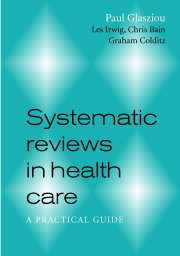Book contents
- Frontmatter
- Contents
- Acknowledgements
- Introduction
- Part 1 General methods
- 1 The question
- 2 Finding relevant studies
- 3 Appraising and selecting studies
- 4 Summarizing and synthesizing the studies
- 5 Applicability: returning to the question
- Part 2 Question-specific methods
- Appendixes
- Glossary
- Acronyms and abbreviations
- References
- Index
2 - Finding relevant studies
Published online by Cambridge University Press: 01 September 2009
- Frontmatter
- Contents
- Acknowledgements
- Introduction
- Part 1 General methods
- 1 The question
- 2 Finding relevant studies
- 3 Appraising and selecting studies
- 4 Summarizing and synthesizing the studies
- 5 Applicability: returning to the question
- Part 2 Question-specific methods
- Appendixes
- Glossary
- Acronyms and abbreviations
- References
- Index
Summary
Finding all relevant studies that have addressed a single question is not easy. There are currently over 22 000 journals in the biomedical literature. MEDLINE indexes only 3700 of these, and even the MEDLINE journals represent a stack of over 200 metres of journals per year.
Beyond sifting through this mass of published literature, there are problems of duplicate publications and accessing the ‘grey literature’, such as conference proceedings, reports, theses and unpublished studies. A systematic approach to this literature is essential in order to identify all of the best evidence available that addresses the question.
As a first step, it is helpful to find out if a systematic review has already been done or is under way. If not, published original articles need to be found.
Finding existing systematic reviews
Published reviews may answer the question, or at least provide a starting point for identifying the studies. Finding such reviews takes a little effort. A general MEDLINE search strategy proposed by McKibbon et al. which is relevant to all question types is given in Appendix A. However, for interventions, a check should also be made of the Cochrane Library for a completed Cochrane review, a Cochrane protocol (for reviews under way) or a nonCochrane review in the Database of Abstracts and Reviews (DARE) on the Cochrane Library, compiled by the Centre for Reviews and Dissemination at York (United Kingdom).
- Type
- Chapter
- Information
- Systematic Reviews in Health CareA Practical Guide, pp. 16 - 26Publisher: Cambridge University PressPrint publication year: 2001



